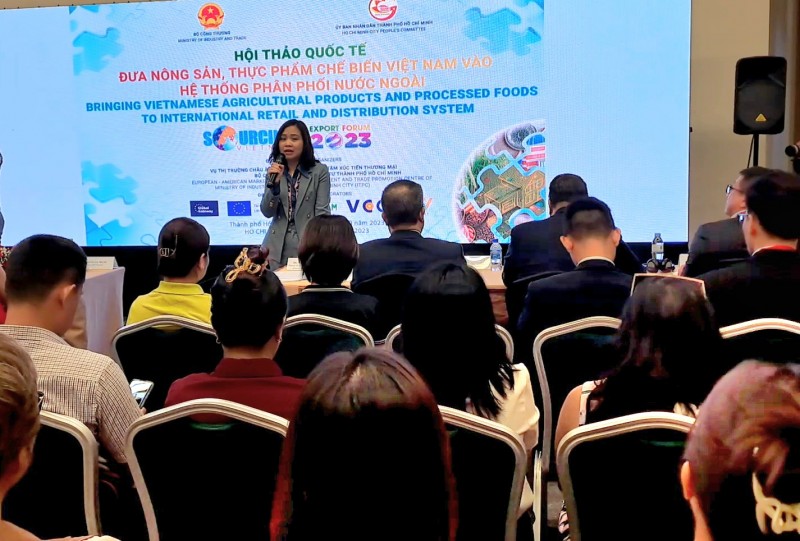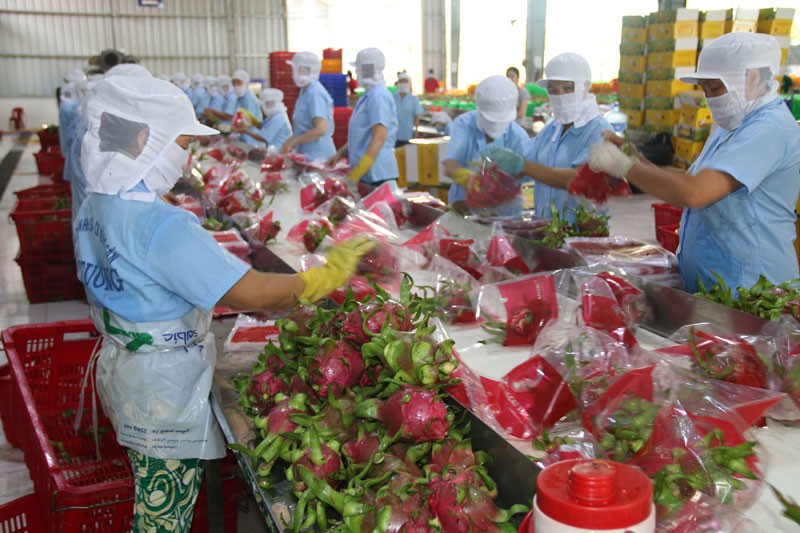 News
News
IMPORT AND EXPORT SEPTEMBER 14, 2023 12:15 Follow Congthuong.vn on
| Discussing solutions to enhance the value of Vietnamese agricultural productsKorean businesses want to expand agricultural export markets in VietnamVietnamese agricultural products: Increase purchasing power, expand market thanks to listing on e-commerce platforms |
Great potential
This is the content presented at the Workshop "Introducing Vietnamese agricultural products and processed foods into foreign distribution systems" within the framework of a series of events connecting international goods supply in 2023 (Vietnam Sourcing 2023 ) by the Ministry of Industry and Trade in coordination with the City People's Committee. Organized by Ho Chi Minh.
Speaking at the conference, Ms. Nguyen Thao Hien, Deputy Director of the European - American Market Department, said that despite the general difficulties of the market and disturbances in the supply chain, Vietnam's agricultural and food exports Vietnam has still had many breakthroughs in recent years.
With the advantages of geographical location, natural conditions, favorable soil and incentives from 15 bilateral and regional free trade agreements being implemented with many partners around the world, especially the Comprehensive and Progressive Agreement for Trans-Pacific Partnership (CPTPP), Vietnam - EU Free Trade Agreement (EVFTA), continuously in recent years, the export turnover of agricultural products, seafood and food maintain double-digit growth rate. In 2022, Vietnam's agricultural, forestry and fishery exports will reach 53.2 billion USD, an increase of nearly 10% compared to 2021. There are many commodity groups with a turnover of over 2 billion USD such as wood, seafood, and coffee. , rubber, rice, vegetables, and cashews..
Especially in 2022, many types of our country's agricultural products such as fresh bananas, sweet potatoes, bird's nest, grapefruit, longan, passion fruit, durian... will be licensed to export to developed markets with high standards. around the world such as America, Japan, China, New Zealand. This creates great opportunities for fruit export.
 |
| Overview of the conference |
In 2023, in a difficult market context, especially high inflation in all major export markets, the export turnover of Vietnam's agricultural, forestry and fishery products is forecast to still surpass figure of 50 billion USD. Currently, Vietnam is the world's top 3 supplier of coffee, the first largest supplier of cashew nuts, the first largest supplier of pepper, the third largest supplier of rice,...
Among agricultural products, vegetables and fruits are one of the bright spots in our country's export industries. Forecasting for the whole year 2023, it is likely that fruit and vegetable exports will reach the historic milestone of 5 billion USD. Experts say that, in the context of global inflation, in 2023, China will still be an attractive market for Vietnamese agricultural products thanks to the booming demand after Covid-19 plus the advantage of a close geographical location. making logistics costs and time risks lower than other markets.
Although there is great potential, according to Ms. Hien, agricultural export is facing many challenges as countries not only adjust their legal frameworks with a series of new laws and regulations. Typically, in mid-May, the EU also issued a law on the Carbon Border Adjustment Mechanism (CBAM). This regulation forces importers into the EU to report carbon emissions in goods. At the end of June 2023, the EU issued the Anti-Forest Degradation Regulation (EUDR). Accordingly, companies trading in wood, coffee, cocoa, rubber, soybeans, cattle, palm oil and derivative products in the EU must prove that the goods they sell are not related to illegal activities. forests from after 2021. Violations will result in a minimum fine of 4% of annual sales collected throughout the EU.
Environmental protection regulations in Vietnam's main export markets such as the EU, North America and Northeast Asian markets are becoming increasingly stricter. The US and Canadian governments are also considering mechanisms similar to the EU's CBAM and EUDR. The EU also clearly stated that the product groups included in CBAM and EUDR will be expanded in the future.
Responds to environmental factors
Mr. Paul Le - Vice President of Central Retail Vietnam Group said that for many years, Central Retail has coordinated with the Ministry of Industry and Trade to organize "Vietnamese Goods Week in Thailand" to help businesses promote their brands and increase sales. Increase sales opportunities into Thai distribution channels. And to export and bring goods into distribution systems, businesses must clearly understand market information. When participating in trade promotion and export connection programs, businesses should bring product stories instead of regular products.
 |
| The quality of Vietnamese agricultural products is increasingly improving |
Citing a specific example, Mr. Paul Le said that at Vietnam Weekly in Thailand in 2022, a Vietnamese seafood enterprise in Ca Mau attracted the attention of customers with a way to approach the market. proactively.
Accordingly, this business brought to the fair two products including shrimp crackers and dried shrimp. After setting up a booth at the fair, this business proactively went to markets and supermarkets in Thailand to learn about the demand for similar products before participating in the B2B connection session.
According to a business representative, in a market survey, the business found that in Thailand, shrimp crackers and shrimp products only account for 25% of the ingredients, while the company's similar products have up to 40%. % shrimp. Notably, these shrimp products are organic shrimp... This proactive research helped the business achieve success after the fair because many customers were interested and signed contracts.
“When participating in fairs, businesses must learn about the market, as well as prepare for product sources. In addition to hard skills such as paperwork, businesses must have soft skills to find markets," Mr. Paul Le emphasized.
Assessing Vietnam's agricultural export potential, Mr. Vincent Gothknecht, Chief Representative of I.Schroeder Company (Germany), said that Vietnam has a great advantage in exporting agricultural products to the EU market thanks to the Agreement. EVFTA.
According to Mr. Vincent, Europe is a demanding market with many strict standards on food safety and hygiene. Products exported to this market must have traceability. Along with that, it ensures requirements for environmental and labor standards.
Reflecting on the quality of Vietnamese agricultural products, Mr. Vincent Gothknecht said that there are currently about 50 suppliers in Vietnam providing agricultural products such as lychees, pineapples, passion fruit... and aquatic products to the company. Accordingly, product quality is no longer a problem for Vietnamese agricultural products. However, the bottlenecks that Vietnamese businesses encounter are mainly environmental requirements, emission reduction, carbon neutrality...
“Many buyers want the suppliers in their supply chain to be carbon neutral. Therefore, if Vietnamese businesses do not meet this standard, they will lose opportunities," Mr. Vincent emphasized.
Along with that is the Government's support for the industries. For example, in the Mekong Delta, Vietnam's exported pangasius and shrimp products... have met many food safety standards of importing countries, including ASC standards ( Aquaculture Stewardship Council) certifies internationally for responsibly farmed seafood, minimizing negative impacts on the environment, ecosystems, communities and ensuring good labor regulations. However, Vietnam is still facing difficulties with caught seafood products. Meanwhile, in many other countries such as the Philippines... caught seafood products have been certified by MSC (Marine Stewardship Council - MSC) to sustainably exploit aquatic resources. Therefore, many seafood businesses have lost the opportunity to export to this market.
Also according to Mr. Vincent Gothknecht, to export to the EU, products must have food safety certification, environmental and labor standards certification... To do this, businesses are required to invest quite a large amount of resources. because this is a mandatory requirement to enter the market.
"The long-distance strategy may lose in the short term, but in the long term the business will definitely win," Vincent Gothknecht emphasized.